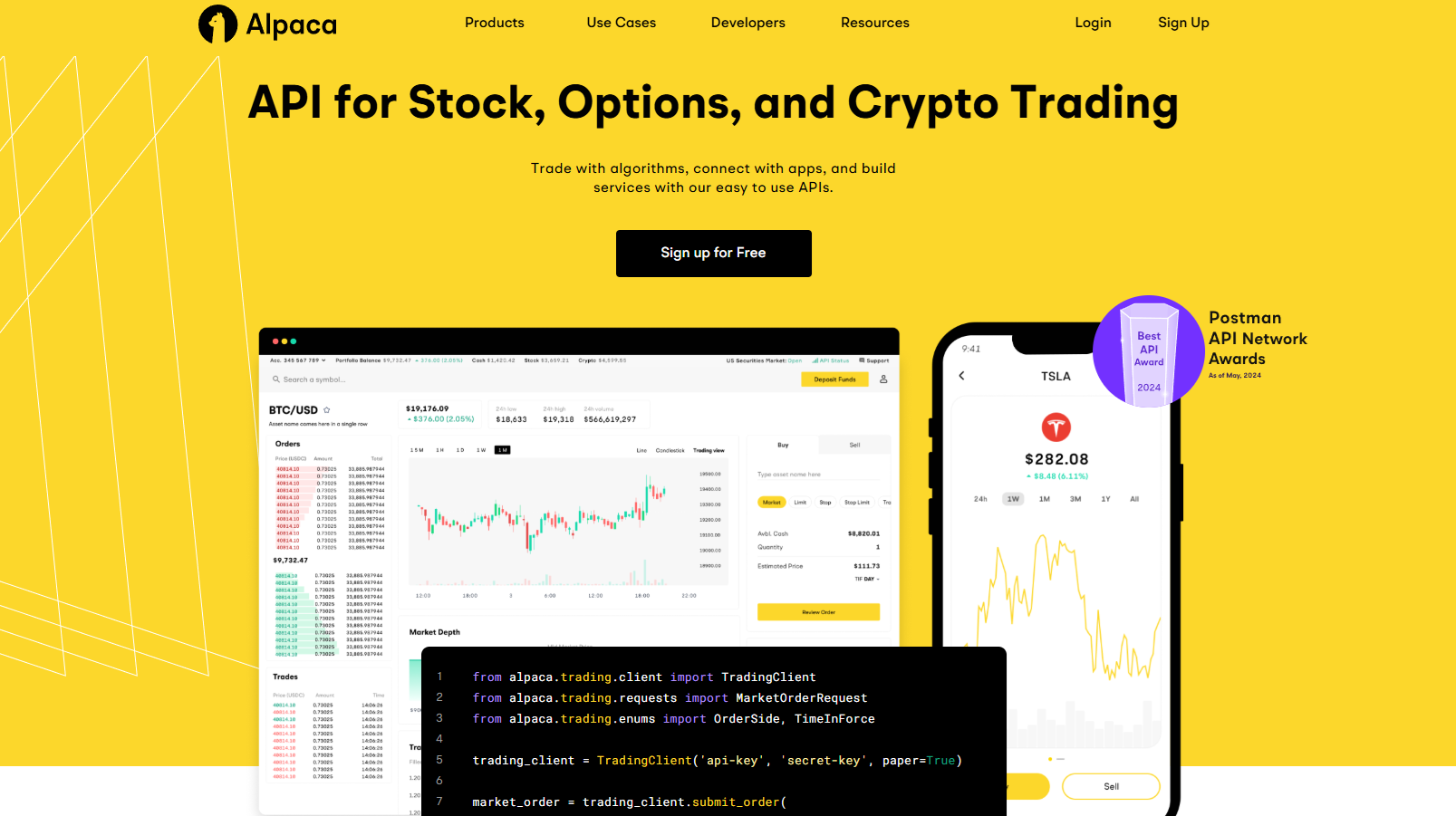Choosing the right stock broker is crucial for investors looking to thrive in Japan’s dynamic financial market. With countless options available, finding the best platform for your goals can be overwhelming. Whether you’re a seasoned trader or a beginner, our curated list of the top 5 stock brokers in Japan for 2024 is here to guide you! From low fees to advanced trading tools, these brokers offer everything you need to make informed investment decisions. Let’s dive in and find the perfect fit for your trading journey.
Criteria for Selecting the Best Stock Brokers
Selecting the best stock brokers in Japan requires careful consideration of several factors to cater to both novice and advanced traders. A broker’s regulatory status, particularly adherence to the Japanese Financial Services Agency guidelines, ensures reliability and investor protection. The availability of powerful trading tools, including advanced charting tools, trading signals, and algo trading, caters to professional traders and those focusing on forex trading or CFD trading. Features like negative balance protection and secure handling of client funds are crucial to safeguard retail investor accounts, especially when trading complex instruments.
Key aspects also include the trading platforms offered, such as web platforms, trading apps, and demo accounts, which support a diverse trading experience. Low trading fees, competitive spreads, and the ability to minimize trading costs are vital for maximizing profitability. Options like commission-free trading, access to global markets, and a variety of currency pairs, commodity futures, and japanese stocks allow for a diversified portfolio. Brokers like Interactive Brokers stand out for their advanced trading tools and support for multiple trading platforms. Finally, ensuring access to a trading academy or educational resources can help seasoned traders and newcomers alike navigate the high risk nature of trading and reduce the likelihood of retail investor accounts losing money rapidly.
The 5 Best Stock Brokers in Japan in 2024
#1. Interactive Brokers
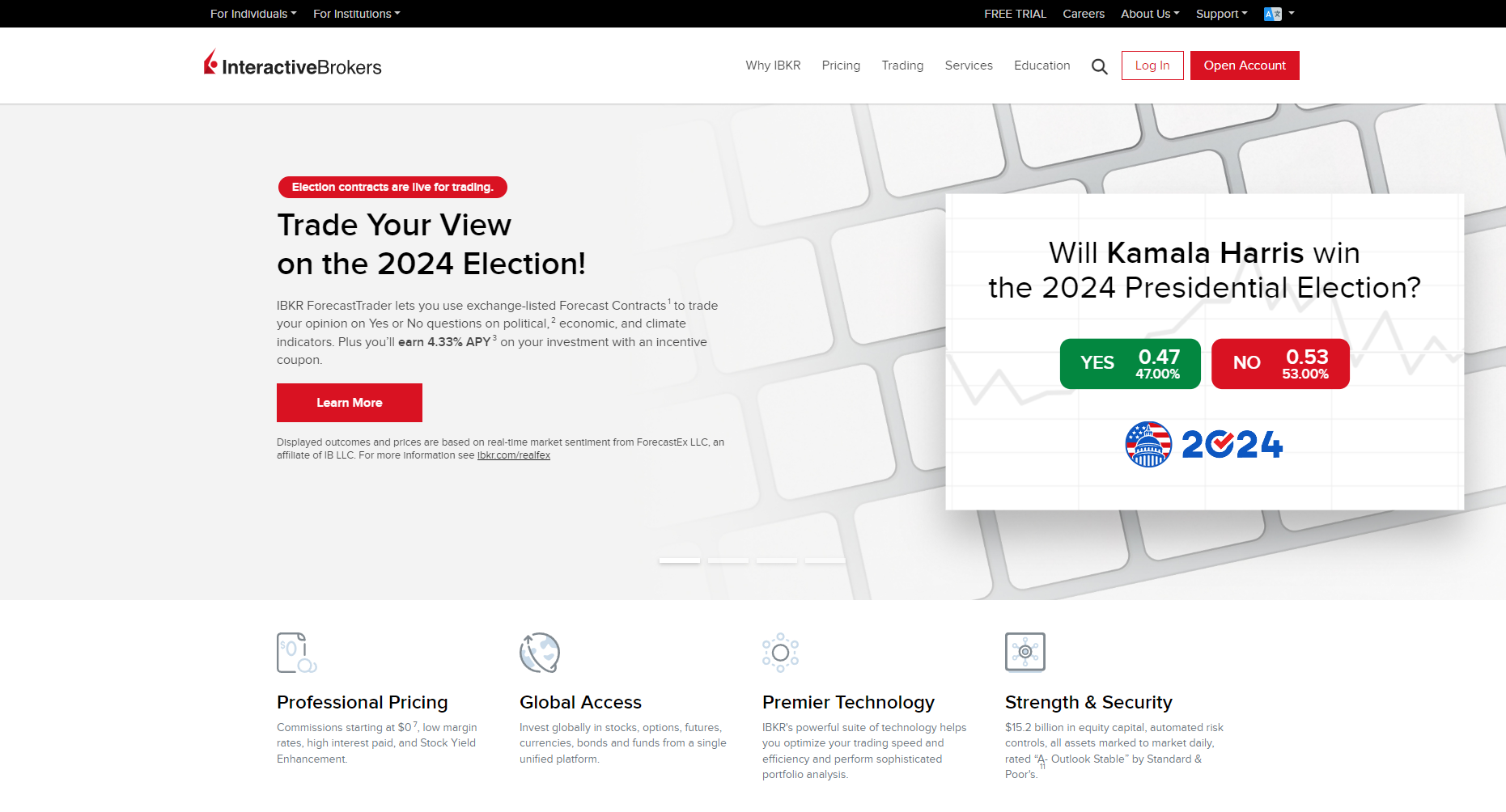
What is Interactive Brokers?
Interactive Brokers (IBKR) is a multinational brokerage firm headquartered in Greenwich, Connecticut, offering a comprehensive electronic trading platform for a diverse range of financial instruments, including stocks, options, futures, forex, bonds, and funds. Operating across over 150 global markets, IBKR caters to both individual and institutional investors, providing access to a wide array of asset classes and markets. The firm is recognized for its advanced trading technology and competitive pricing structure, appealing to active traders and professionals seeking efficient and cost-effective trading solutions.
Advantages and Disadvantages of Interactive Brokers
Interactive Brokers Commissions and Fees
Interactive Brokers offers a tiered and fixed pricing structure, allowing clients to choose the model that best fits their trading volume and preferences. The fixed pricing charges a set rate per share or contract, encompassing all commissions and exchange fees. In contrast, the tiered pricing varies based on monthly trading volume, potentially offering lower costs for high-frequency traders. Notably, IBKR maintains a policy of no added spreads, ticket charges, platform fees, or account minimums, enhancing its appeal to cost-conscious investors.
OPEN AN ACCOUNT NOW WITH INTERACTIVE BROKERS AND GET YOUR WELCOME BONUS
#2. Webull
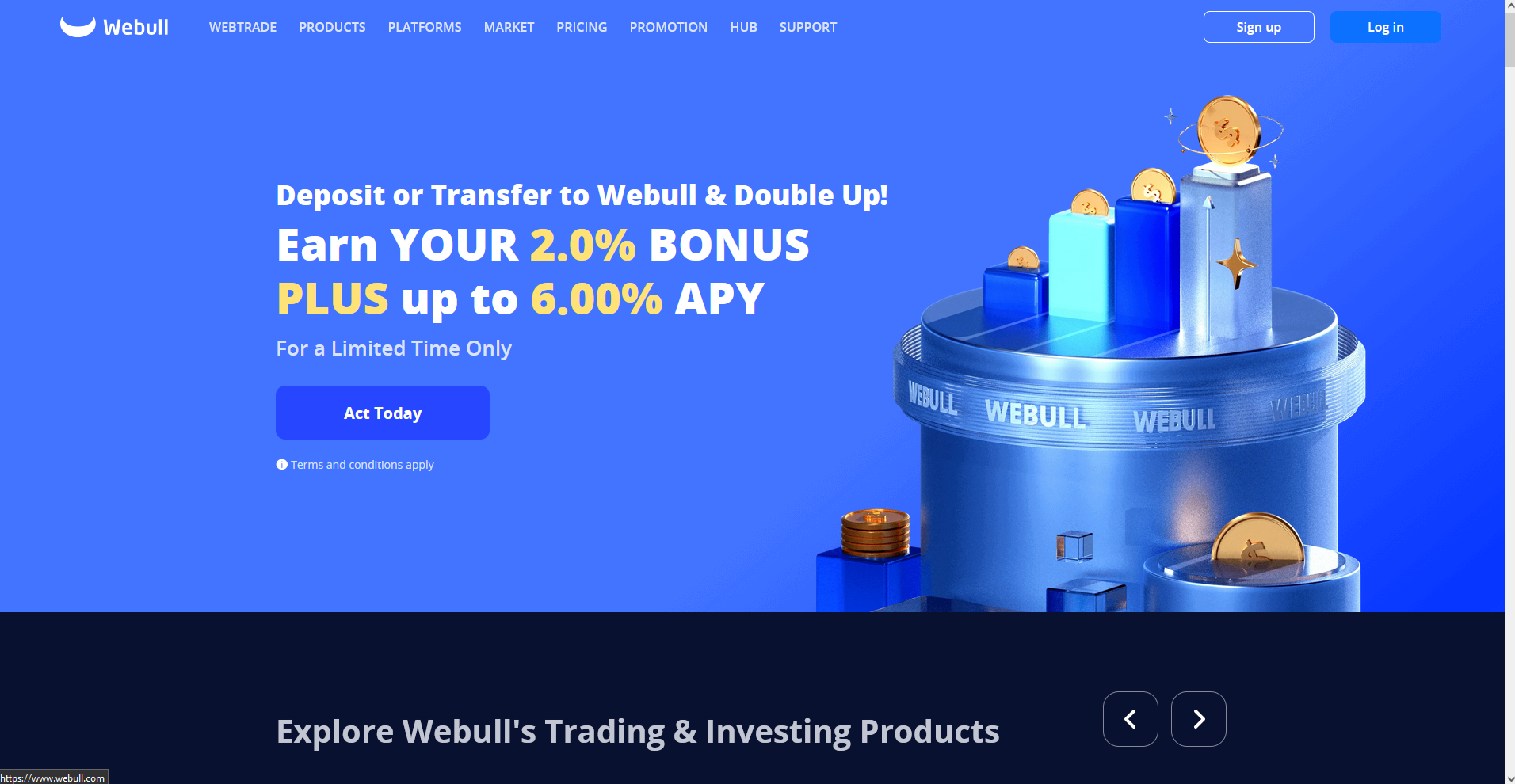
What is Webull?
Webull is a mobile-first brokerage platform offering commission-free trading of stocks, ETFs, and options. Designed with a user-friendly interface, it caters to both novice and experienced investors, providing tools like advanced charting and a vibrant user community. However, its educational resources are limited, and customer support options are not as robust as some competitors.
Advantages and Disadvantages of Webull
Webull Commissions and Fees
Webull offers commission-free trading for stocks, ETFs, and options listed on U.S. exchanges. However, certain transactions, such as index options, incur a $0.55 per contract fee. Additionally, regulatory fees, like the SEC and FINRA fees, apply to specific trades, which are passed through to clients without markup.
OPEN AN ACCOUNT NOW WITH WEBULL AND GET YOUR WELCOME BONUS
#3. moomoo
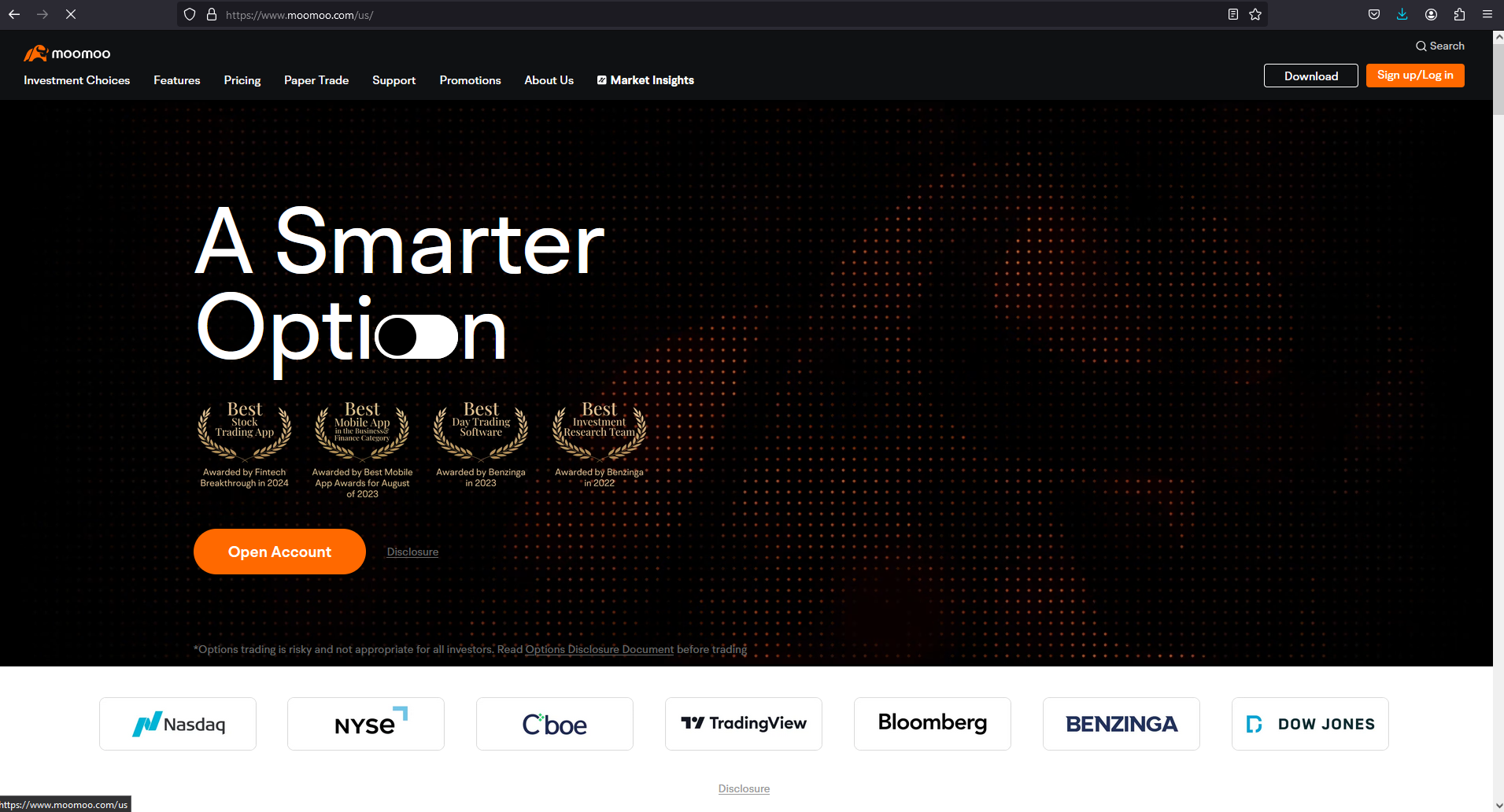
What is moomoo?
moomoo is a trading platform designed for beginners and experienced traders alike, offering advanced tools and market insights. It provides real-time data, customizable charts, and an intuitive interface to enhance trading efficiency. The platform is backed by Futu Holdings and is regulated in multiple jurisdictions, ensuring reliability and trustworthiness. Users can access equities, ETFs, options, and other financial instruments.
Advantages and Disadvantages of moomoo
moomoo Commissions and Fees
moomoo offers commission-free trading for stocks and ETFs in the U.S. market, making it cost-effective for investors. Options trading involves a fee of $0.65 per contract, which is competitive but not the lowest in the industry. Other charges, such as inactivity fees or withdrawal costs, are minimal or non-existent. Overall, moomoo’s fees are transparent and suitable for budget-conscious traders.
OPEN AN ACCOUNT NOW WITH MOOMOO AND GET YOUR WELCOME BONUS
#4. Alpaca Trading
What is Alpaca Trading?
Alpaca Trading is a commission-free platform designed for trading stocks and ETFs through APIs, catering primarily to developers and algorithmic traders. It offers advanced automation tools and integrates with third-party platforms for seamless execution of trades. With a focus on customization, Alpaca Trading enables users to create and deploy trading strategies with ease. Its cloud-based infrastructure makes it accessible globally.
Advantages and Disadvantages of Alpaca Trading
Alpaca Trading Commissions and Fees
Alpaca Trading stands out with its zero-commission policy for stock and ETF trades, making it cost-effective for frequent traders. There are no account maintenance or inactivity fees, appealing to both active and casual investors. Additional costs may apply for data subscriptions or margin trading, depending on user preferences. This transparent fee structure aligns with the platform’s developer-centric model.
OPEN AN ACCOUNT NOW WITH ALPACA TRADING AND GET YOUR WELCOME BONUS
#5. CapTrader
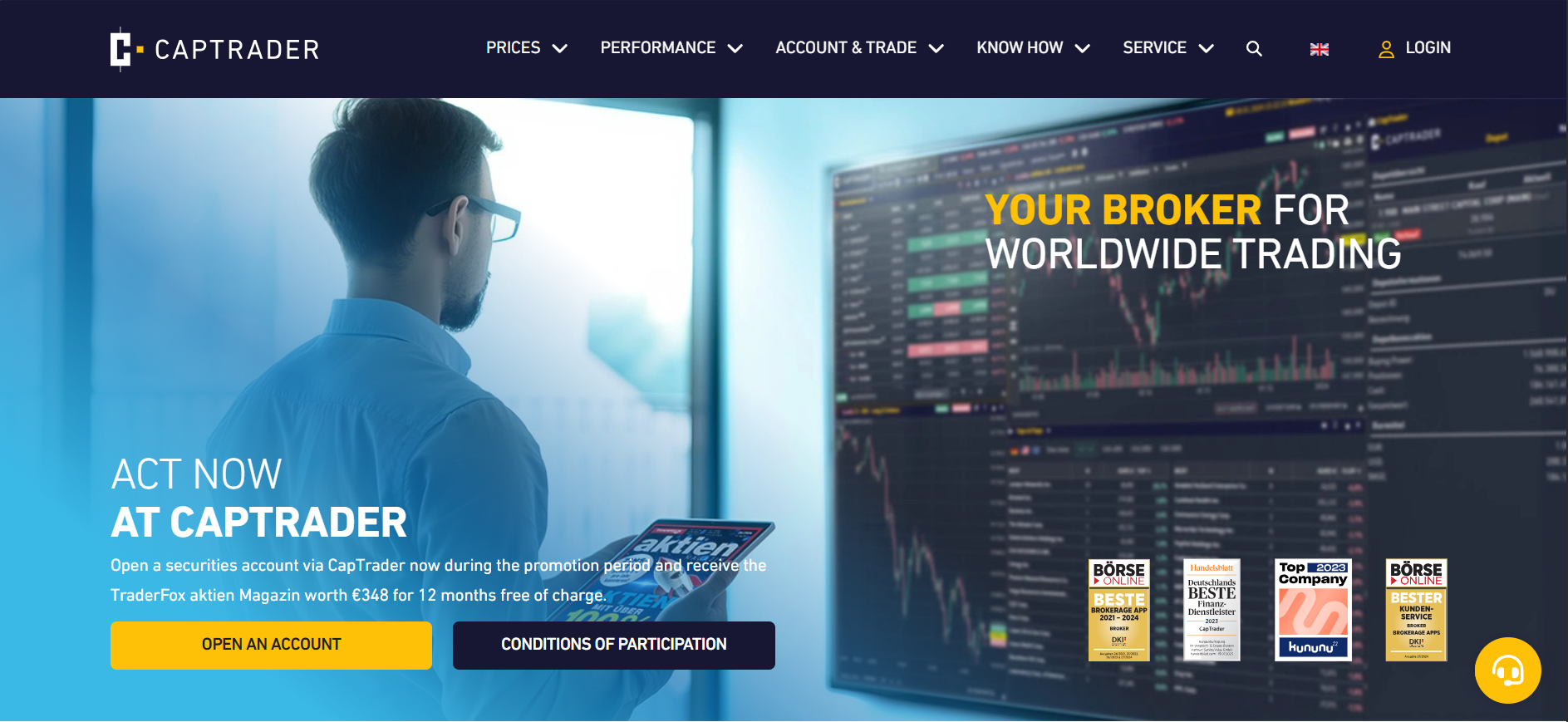
What is CapTrader?
CapTrader is a Germany-based online brokerage firm offering access to over 150 global markets across 33 countries. It provides a wide range of financial instruments, including stocks, ETFs, options, futures, and forex, catering to both private investors and professional traders. The platform is recognized for its professional trading tools and comprehensive research resources, appealing particularly to advanced traders.
Advantages and Disadvantages of CapTrader
CapTrader Commissions and Fees
CapTrader offers competitive commissions for stock and ETF trades, with U.S. stocks priced at $0.01 per share and a minimum of $2 per trade. However, fees for other products, such as forex and trading CFDs, are relatively higher. The platform charges an inactivity fee of $1 per month if the account balance is below $1,000 and no trades have been executed in the past month. Additionally, while the first withdrawal each month is free, subsequent withdrawals may incur fees.
OPEN AN ACCOUNT NOW WITH CAPTRADER AND GET YOUR WELCOME BONUS
Key Features to Look for in a Stock Broker
When choosing a broker in Japan, it’s vital to evaluate features that meet the needs of retail investor accounts and professional traders alike. Prioritize brokers regulated by the Japanese Financial Services Agency, ensuring secure handling of client funds and adherence to stringent laws for forex trading legal and trading CFDs. Look for low trading fees, competitive spreads, and tools to minimize trading costs, especially for trading complex instruments like commodity futures and currency pairs.
Top online brokers offer access to multiple asset classes on advanced trading platforms like web, app, and desktop. Features such as advanced charting tools, algo trading, and trading signals are essential for experienced traders. A demo account allows testing strategies before funding a live trading account. Whether trading Japanese yen, Japanese stocks, or engaging with global markets, a regulated broker with options like commission-free trading, negative balance protection, and a robust trading academy can significantly enhance your trading experience.
Also Read: The 5 Best Binary Brokers in Japan for 2024
Conclusion:
For retail investor accounts in Japan, finding the best stock brokers in Japan ensures access to reliable trading platforms with low trading costs. With forex trading gaining popularity among forex traders, selecting a best forex broker regulated by the Japanese Financial Services Agency offers enhanced security. Key factors include negative balance protection, access to advanced trading tools, and support for multiple asset classes, such as currency pairs, commodity futures, and Japanese stocks. For both professional traders and seasoned traders, competitive spreads, algo trading, and trading signals enhance market efficiency.
Leveraging market research and a trading academy, traders can minimize the high risk of losing money. Brokers offering demo accounts, commission-free trading, and powerful trading tools attract japanese traders and advanced traders seeking to build a diversified portfolio. Whether using a web platform or a trading app, the right regulated broker ensures safe navigation of global markets and the Japanese market while protecting client funds.
Frequently Asked Questions About Stock Brokers in Japan
What are the best stock brokers in Japan for retail investors?
The best stock brokers in Japan offer low trading fees, negative balance protection, and access to multiple asset classes, regulated by the Japanese Financial Services Agency.
Is forex trading legal in Japan?
Yes, forex trading is legal in Japan and is regulated by the Financial Services Agency, ensuring protection for retail investor accounts.
What trading platforms are popular in Japan?
Traders in Japan prefer web platforms and trading apps with advanced charting tools and algo trading for accessing global markets and competitive spreads.

